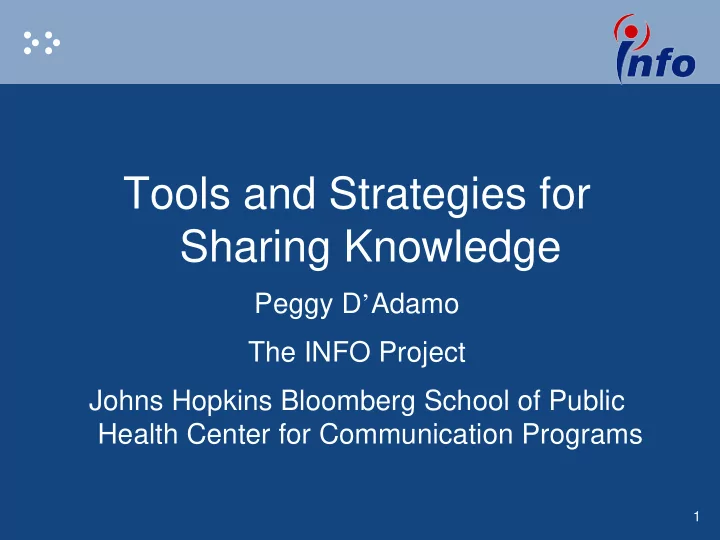

Tools and Strategies for Sharing Knowledge Peggy D ’ Adamo The INFO Project Johns Hopkins Bloomberg School of Public Health Center for Communication Programs 1
Knowledge Sharing Tools & Strategies Why should we share knowledge? 2
Knowledge Sharing Tools & Strategies • Do more • Achieve better results • Save time • Save money • Reduce duplication of effort • Avoid making the same mistakes • Learn from experiences of others 3
Our challenge. . . 4
Knowledge Sharing Tools & Strategies Obstacles to sharing knowledge: • Lack of time • Hard to break from routine • Knowing what ’ s important to share • Knowing who ’ s interested • Finding a way to stay connected 5
Knowledge Sharing Tools & Strategies This presentation will give you ideas for: • Staying connected with the contacts you make during the workshop • Sharing what you learn here with your colleagues at home • Enhancing local participation in the global dialogue 6
Knowledge Sharing Tools & Strategies 7
Knowledge Sharing Tools & Strategies Knowledge management is • Know-how • Know-what • Know-why • Know-who • Know-when 8
Knowledge Sharing Tools & Strategies Designing a better wheel, rather than re-inventing it . 9
Knowledge Sharing Tools & Strategies Just the tip of the iceberg… Exp licit Easy to docum ent & 20% Explicit share in written form . Easy to replicate. Contributes to efficiency. Ta cit Im p licit Difficult to Em bedded articulate & “ know-how ” transfer. Part of work Hard to replicate. routines and 80% Tacit & Leads to practices Implicit com petency. 10
Knowledge Sharing Tools & Strategies Knowledge TACI T EXPLI CI T I MPLI CI T Research Business Statistical P Workshops intelligence e.g. modeling U Create Challenge funding analysis Reasoning R sessions tools P O Capacity assessments Shared Drives I nternet S Exit I Vs I nfo Center Email E Store Handovers Taxonomies Publications Databases CD RO Mentoring I ntranet After Action Reviews Coaching I nternet Retrospects Share Communities Email Evaluations Training Publications CD ROMs Knowledge and Learning Tools (adapted from Nutley et al, 2003) 11
Knowledge Sharing Tools & Strategies I. How to stay connected with the contacts you made and take advantage of the networks you established during this workshop. 12
Knowledge Sharing Tools & Strategies Communitiy of Practice (Cop) • Group of people with a common concern who share knowledge & expertise on an ongoing basis • Can be small/large, virtual/physical, internal/linked to outsiders • Not a team or work group 13
Knowledge Sharing Tools & Strategies Community of Practice Experts Mem bers Lurkers Mentors Dagram by Steve Song (ssong@bellanet.org) of Bellanet ( www.bellanet.org ). 14
Knowledge Sharing Tools & Strategies II. Strategies for sharing what you learned at the workshop with your staff and colleagues back at home. 15
Knowledge Sharing Tools & Strategies Mentoring & Coaching • A learning relationship between two people • Experienced person shares his/her knowledge • Can happen in or outside the workplace 16
Knowledge Sharing Tools & Strategies Debriefing or oral presentation – Seminar – workshop – brown bag – after action review Written report – Newsletter articles or e-mail to colleagues – Intranet, website feature – Checklist, FAQ, fact sheet Event – Poster, demonstration, knowledge fair, or display 17
Knowledge Sharing Tools & Strategies Debriefing Exercise: 10 points in 10minutes 1. Workshop theme 2. Workshop dates 3. Workshop location 4. Who was there? 5. Overview of sessions 6. Highlights of your favorite sessio 7. Highlights of another session 8. Who you met & the value of these contacts 9. Overall impression of worksho 10. Q&A/contact info for materials 18
Knowledge Sharing Tools & Strategies After action review (AAR) 1. What was supposed to happen? Why? 2. What actually happened? Why? 3. What is the difference? Why? 4. What went well? Why? 5. What could have gone better? Why? 6. What lessons can be learned? 19
Knowledge Sharing Tools & Strategies III. How to increase and enhance local participation in the global dialogue. 20
Knowledge Sharing Tools & Strategies Why contribute to the Global Knowledge Base? Can something that has worked well in one location be applied in another one? Start by assuming that somebody, somewhere will want to do what you ’ re already doing. 21
Knowledge Sharing Tools & Strategies The Global Knowledge Base: A repository of best-practices, lessons learned, tips, tools,expertise; Accessible to everyone; Everyone contributes to it and everyone draws from it. 22
Knowledge Sharing Tools & Strategies Knowledge-sharing resources from INFO: • INFO web site and One Source database • Photoshare • POPLINE • RH Gateway • USAID Global Health E-Learning Center • Specialized Web-based tools 23
Knowledge Sharing Tools & Strategies Other global knowledge-sharing resources in RH • Development Gateway • Population and Health InfoShare • Implementing Best Practices Knowledge Gateway • The Communication Initiative 24
Knowledge Sharing Tools & Strategies How to stay connected with the contacts and networks you establish during the workshop. How to share what you learn at the workshop with colleagues at home. How to enhance your participation in the global dialogue. 25
Facilitate The challenge at-scale im plem entation Prom ote Save tim e collaboration & m oney Enable Solve innovation problem s & creativity Share Capture lessons “know how” Increase learned sustainability of interventions 26
Knowledge Sharing Tools & Strategies Knowledge Sharing Checklist What have I learned from this activity and who could I share this knowledge with? What have I learned from global knowledge base and how can I build on it? Who are the experts on this topic? Have I discussed this with them? What did I learn? What have I learned that I could use in a new project? 27
Knowledge Sharing Tools & Strategies Thank - you! 28
Recommend
More recommend